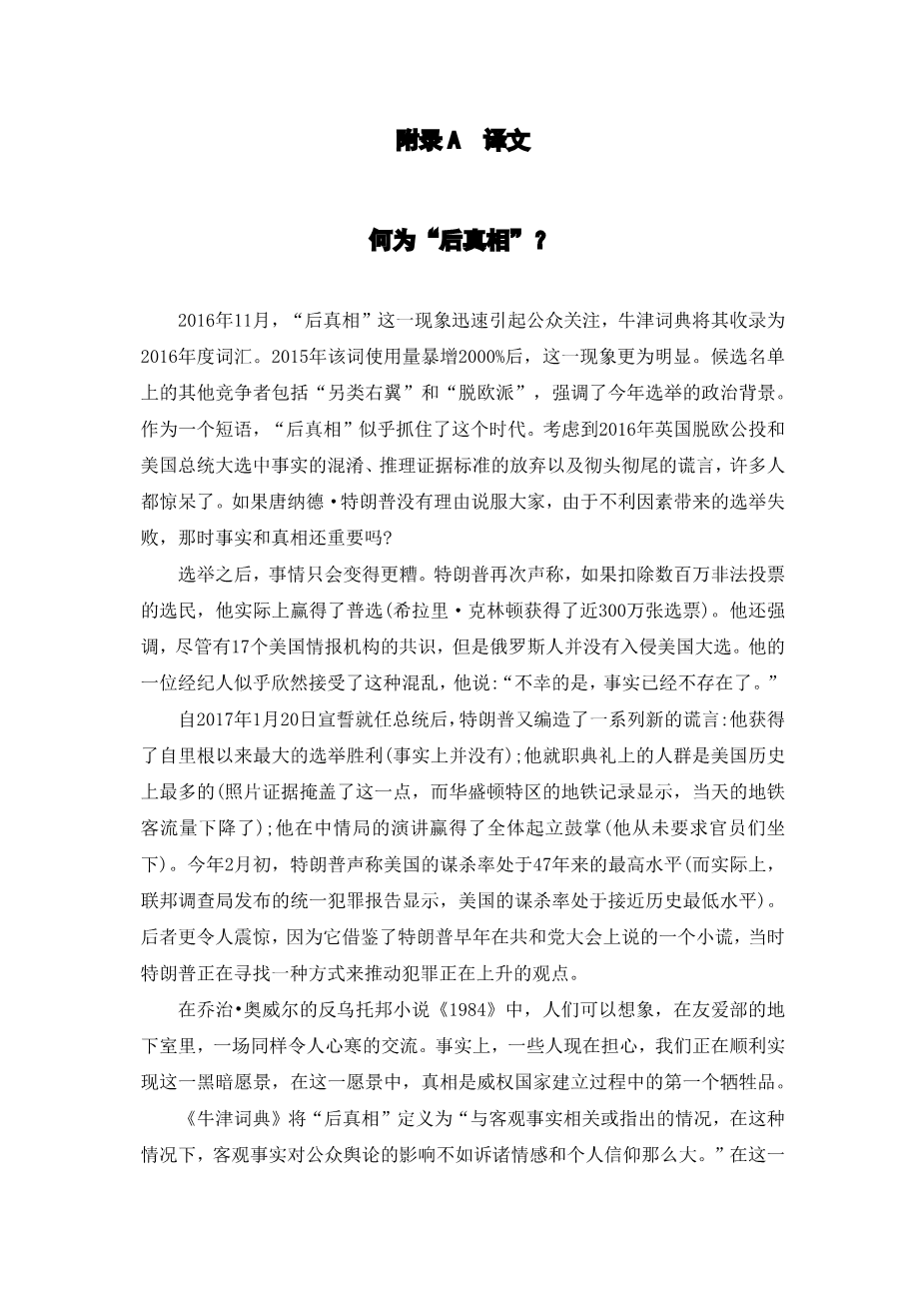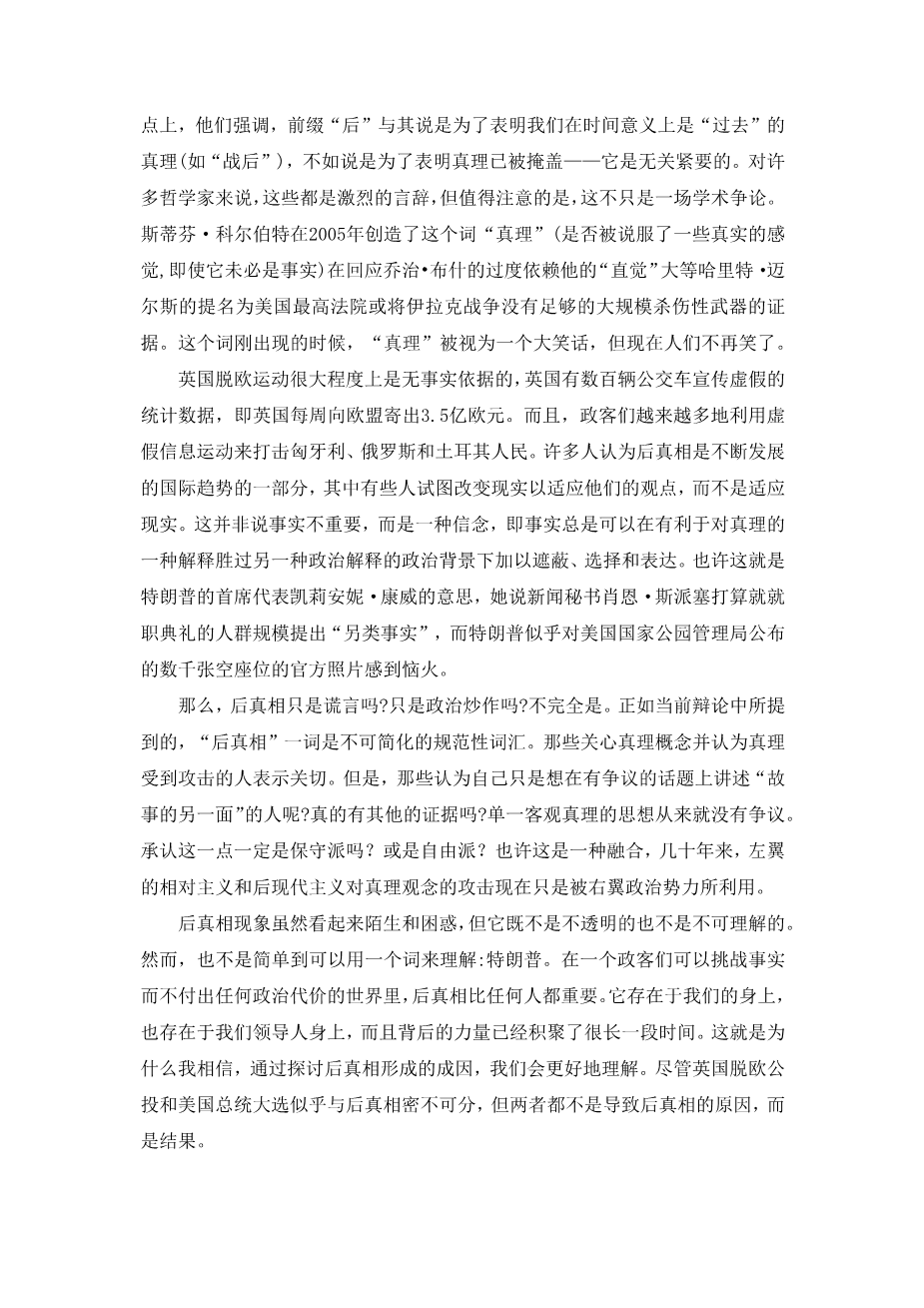附录B 外文原文
Whatis Post-truth?
The phenomenon of “post-truth” rocketed to public attention in November 2016, when the Oxford Dictionaries named it 2016’s word of the year. After seeing a 2,000 percent spike in usage over 2015, the choice seemed obvious. Among the other contenders on the shortlist were “alt-right” and “Brexiteer,” highlighting the political context of the year’s selection. As a catch-all phrase, “post-truth” seemed to capture the times. Given the obfuscation of facts, abandonment of evidential standards in reasoning, and outright lying that marked 2016’s Brexit vote and the US presidential election, many were aghast. If Donald Trump could claim—without evidence—that if he lost the election it would be because it was rigged against him, did facts and truth even matter anymore?
After the election, things only got worse. Trump claimed—again with no facts to back him up—that he had actually won the popular vote (which Hillary Clinton had taken by nearly 3 million votes), if one deducted the millions of people who had voted illegally. And he doubled down on his claim that—despite the consensus of seventeen American intelligence agencies—the Russians had not hacked the American election. One of his handlers seemed to embrace the chaos by arguing that “there’s no such thing, unfortunately, anymore as facts.”
After being sworn in as president on January 20, 2017, Trump offered a string of fresh falsehoods: that he had the biggest electoral victory since Reagan (he didn’t); that the crowd at his inauguration was the largest in US history (photographic evidence belies this and Washington, DC, Metro records show subway ridership down that day); that his speech at the CIA resulted in a standing ovation (he never asked the officers to sit). In early February, Trump claimed that the US murder rate was at a forty-seven-year high (when in fact the Uniform Crime Report from the FBI showed it to be at a near-historic low). The latter seems particularly egregious because it picks up on an earlier fib that Trump had told at the Republican convention, while searching for a way to push the idea that crime was on the rise.
One might imagine a no less chilling exchange in the basement of the Ministry of Love in the pages of George Orwell’s dystopian novel 1984. Indeed, some now worry that we are well on our way to fulfilling that dark vision, where truth is the first casualty in the establishment of the authoritarian state.
The Oxford Dictionaries define “post-truth” as “relating to or denoting circumstances in which objective facts are less influential in shaping public opinion than appeals to emotion and personal belief.” In this, they underlinethat the prefix “post” is meant to indicate not so much the idea that we are “past” truth in a temporal sense (as in “postwar”) but in the sense that truth has been eclipsed—that it is irrelevant. These are fighting words to many philosophers, but it is worth noting that this is much more than an academic dispute. In 2005, Stephen Colbert coined the term “truthiness” (defined as being persuaded by whether something feels true, even if it is not necessarily backed up by the facts) in response to George W. Bush’s excesses in relying on his “gut” for big decisions—such as the nomination of Harriet Miers for the US Supreme Court or going to war in Iraq without adequate proof of weapons of mass destruction. When the term was coined, “truthiness” was treated as a big joke, but people aren’t laughing anymore.
With the largely fact-free campaign over Brexit in Great Britain—where hundreds of buses advertised the bogus statistic that the UK was sending 350 million euros a week to the EU—and the growing use of disinformation campaigns by politicians against their own people in Hungary, Russia, and Turkey, many see post-truth as part of a growing international trend where some feel emboldened to try to bend reality to fit their opinions, rather than the other way around. This is not necessarily a campaign to say that facts do not matter, but instead a conviction that facts can always be shaded, selected, and presented within a political context that favors one interpretation of truth over another. Perhaps this is what Trump’s chief surrogate, Kellyanne Conway, meant when she said that press secretary Sean Spicer had intended to present “alternative facts” regarding the size of the crowd at the inauguration,when Trump seemed miffed by official US Park Service photos showing thousands of empty seats.
So is post-truth just about lying, then? Is it mere political spin? Not precisely. As presented in current debate, the word “post-truth” is irreducibly normative. It is an expression of concern by those who care about the concept of truth and feel that it is under attack. But what about those who feel that they are merely trying to tell the “other side of the story” on controversial topics? That there really is a case to be made for alternative facts? The idea of a single objective truth has never been free from controversy. Is admitting this necessarily conservative? Or liberal? Or perhaps it is a fusion, whereby largely left-wing relativist and postmodernist attacks on the idea of truth from decades ago have now simply been co-opted by right-wing political operatives.
Although it may seem alien and perplexing, the phenomenon of post-truth is neither opaque nor impenetrable. Yet neither is it so simple that it can be understood in a single word: Trump. In a world in which politicians can challenge the facts and pay no political price whatsoever, post-truth is bigger than any one person. It exists in us as well as our leaders. And the forces behind it have been building up for quite some time. This is why I believe thatwe have our best shot at understanding post-truth by exploring the factors that led up to it. Although the Brexit vote and the US presidential election may seem inextricably tied up with post-tru
剩余内容已隐藏,支付完成后下载完整资料


英语译文共 2 页,剩余内容已隐藏,支付完成后下载完整资料
资料编号:[420986],资料为PDF文档或Word文档,PDF文档可免费转换为Word


